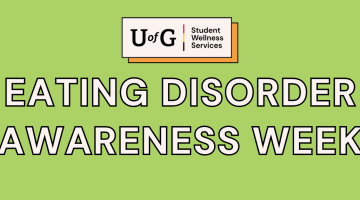All About: Caffeine
An Infokit by the Wellness Education and Promotion Centre, University of Guelph
Topics Include:
- Background Information
- Health Canada's Caffeine Intake Recommendations
- Caffeine Intake and Your Health
- Alcohol Consumption & Caffeine
Background Information on Caffeine:
Did you know that caffeine is the most widely used psychoactive drug in the world?
Caffeine in its natural and synthetic forms is found in a growing list of products including coffee, tea, cola beverages, energy drinks, chocolate and even some medicines. The increasing presence of caffeine in our lives raises the question of how much is too much for the average consumer.
There have been many studies over the years dealing with caffeine and human health, specifically looking at general toxicity (e.g., muscle tremors, nausea, irritability), cardiovascular effects (e.g., heart rate, cholesterol, blood pressure), effects on calcium balance and bone health (e.g., bone density, risk of fractures), behavioural effects in both adults and children (e.g., anxiety, mood changes, attentiveness), potential links to cancer, and effects on reproduction (e.g., male and female fertility, birth weight) as risks from caffeine use.
Health Canada's Caffeine Intake Recommendations:
Health Canada recommends that the maximum daily caffeine intake of the average adult should be no more than 400 mg/day. That looks like about three 8-oz coffees (AKA three small coffees or one extra large coffee from Tim Horton's). That number is reduced slightly for those who are pregnant or breastfeeding or who are planning to become pregnant to 300 mg/day (or 2 8-oz coffees).
Everyone's body can handle caffeine differently, and that will change as we age as our weight fluctuates over time. Listen to your body, and when you begin feeling the general signs of "general toxicity" like jitters, insomnia, headaches, irritability, and nervousness, take a step back!
Alcohol Consumption with Caffeine:
Contrary to popular belief, drinking coffee will not help you to “sober up” if you’ve had too much alcohol. The caffeine will make you more alert, but your coordination and concentration will still be impaired.
Combining high doses of caffeine with alcohol can be dangerous because caffeine can make you feel less intoxicated, so you may continue to drink more or behave in ways that are risky to you and others.
Remember that drinking caffeine, in combination with alcohol, does not reduce the amount of alcohol actually in your body. Caffeine simply makes you feel more aware and less intoxicated, making it much easier to drink more alcohol than you intended to.
For some folks, energy drinks are the caffeine of choice when drinking alcohol. If you regularly pair alcohol with energy drinks, here are a couple of questions that you may consider: Why do I want to mix energy drinks with alcohol? Is it the taste? Have I been told that it will keep me from getting drunk? Energy drinks or otherwise, am I being responsible in my consumption of alcohol?
How Caffeine Affects Sleep and Studying:
Caffeine can impact the onset of sleep and reduce sleep time, efficiency, and satisfaction levels. When caffeine is absorbed into the body, the caffeine that is distributed to the brain blocks the adenosine receptors there. Adenosine is a sleep-promoting chemical that is produced in the brain when we're awake, and the buildup of adenosine is what makes us sleepier over time.
Caffeine reduces the time we spend in the stage of deep, restful sleep, known as slow-wave sleep, which leaves us feeling refreshed and alert in the morning. Caffeine-interrupted sleep can lead to sleep deprivation the following day, which is characterized by fatigue and problems with learning, memory, problem-solving, and emotion regulation. This means that if you grabbed an espresso to help you stay up longer to study for your exam the next day, you're actually making it harder to remember what you studied.
Studies recommend limiting caffeine intake within 4-6 hours before bed. That being said, caffeine can have a positive short-term impact on studying by helping you to focus, improve your mood, and consolidate memory. These positive effects of caffeine can be lost when we overdo it - shifting us into those "toxicity" symptoms from Page 1, so aim to stick to the recommended daily amount, and to not drink caffeine too late in the day, for maximum benefit.



